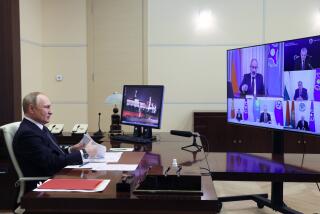Rights Talks in Moscow Get Reagan’s OK
- Share via
WASHINGTON — President Reagan, persuaded by an unprecedented release of Soviet political prisoners and other signs of reform, has decided to endorse Soviet plans for an international human rights conference in Moscow in 1991, Administration officials said Tuesday.
Reagan’s decision, based on the recommendation of Secretary of State George P. Shultz, clears the way for the conference, which the Soviet Union hopes will showcase the human rights reforms of President Mikhail S. Gorbachev.
The action by Reagan removes a significant irritant in U.S.-Soviet relations and could improve the climate for negotiations on other issues by the incoming Bush Administration.
A senior State Department official said that the U.S. decision to attend the conference is intended to “keep the spotlight” on the Soviets’ performance and should not be considered as a seal of approval on all of Moscow’s present practices.
However, the official said, the Gorbachev government has released many of its longest-held political prisoners, made it easier for Jews and some others to emigrate, ended the jamming of all foreign radio broadcasts and stopped persecuting Soviet human rights monitors.
He said that Washington long ago issued guidelines that it said Moscow would have to meet if it hoped to host the conference. “We’re satisfied that the guidelines have been met,” he declared.
Begun in Helsinki
The conference would be part of the Conference on Security and Cooperation in Europe, which was first convened in Helsinki, Finland, in 1976. Now that Reagan has approved American participation, the 1991 Moscow meeting is expected to be approved by the current session of the conference, which is nearing a conclusion of its meetings in Vienna.
Later this month, Shultz will take part with officials from 35 other nations in Vienna in formally issuing a declaration authorizing the Moscow meeting.
The Soviet request to conduct a human rights conference was one of the few remaining loose ends in Vienna. However, a U.S. official said that a few minor issues must still be settled. Austrian authorities predicted last month that the conference would end Jan. 17, although U.S. officials say that date is not yet certain.
Some senior foreign policy advisers to President-elect George Bush are known to be opposed to the Moscow human rights meeting because they believe that the Soviet regime remains oppressive, despite Gorbachev’s limited reforms. These advisers consider such a conference to be premature, at best.
Reagan’s decision was made with Bush’s approval. However, by taking the controversial step in the final weeks of his term, Reagan saves Bush from what could have been a difficult decision early in his new Administration.
Reagan followed the same pattern on another controversial issue when he ended a 13-year-old U.S. diplomatic boycott of the Palestine Liberation Organization last month.
(The announcement of Reagan’s decision is scheduled to be announced by the White House in Los Angeles this morning, wire services reported.)
At the human rights conference, the Soviets are expected to try to change the focus of the debate from limits on political dissent, freedom of the press and free speech to unemployment, homelessness, racism and other matters on which they believe the United States is deficient.
Last week, the State Department set the stage for Reagan’s decision, listing some human rights advancements made by Gorbachev. Among the reforms acknowledged were the release of more than 600 political prisoners during the last two years and the resolution of some 50 cases of “refuseniks” late last year. State Department spokesman Phyllis Oakley, citing commitments by Gorbachev to continue making reforms, said in a statement Friday that “the Soviet Union has taken a number of significant, positive actions on human rights in recent months.”
Gorbachev, under attack by internal opponents because of his measures permitting more domestic dissent, has been pressing for acknowledgement of his reforms from the West.
More to Read
Sign up for Essential California
The most important California stories and recommendations in your inbox every morning.
You may occasionally receive promotional content from the Los Angeles Times.










